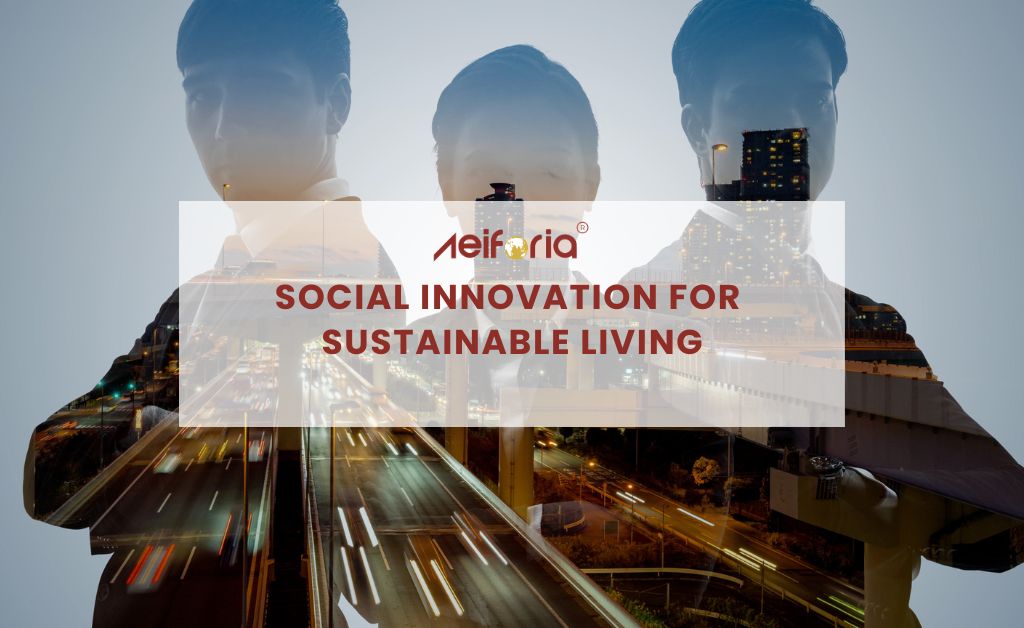
Social Innovation for Sustainable Living
In today's world, the global community faces numerous challenges that are hard to deal with. Social innovation has emerged as a ray of hope for a sustainable future.
Social innovation is the process of creating practical solutions to societal issues, and it is becoming more and more crucial to achieving a sustainable way of life.
This blog post explores the symbiotic relationship between social innovation and sustainable living, shedding light on how these interconnected concepts pave the way for a greener and more harmonious world.
Defining Social Innovation:
Social innovation involves creating and implementing novel ideas, strategies, and initiatives that address societal challenges. It transcends traditional problem-solving approaches, encouraging a holistic perspective that integrates environmental, economic, and social considerations.
Social innovation catalyses positive change when applied to sustainable living, fostering a collective mindset toward long-term well-being.
The Role of Social Innovation in Sustainable Living:
Community Empowerment
Social innovation empowers communities to take charge of their sustainable future. By fostering collaboration and inclusivity, initiatives such as community gardens, eco-villages, and local renewable energy projects harness the power of collective action.
These endeavours not only promote environmental stewardship but also contribute to the well-being of community members.
Technology for Sustainability
Integrating cutting-edge technology is a hallmark of social innovation. In sustainable living, technological advancements are pivotal in optimising resource use, reducing waste, and mitigating environmental impact.
Smart cities, for example, leverage technology to enhance energy efficiency, manage waste, and promote sustainable transportation.
Socially Responsible Business Practices
Socially innovative businesses are redefining the corporate landscape by prioritising sustainability. Companies that embrace environmentally friendly practices, ethical sourcing, and fair labour conditions contribute to a more sustainable global economy.
Consumers, in turn, are increasingly favouring businesses committed to social and environmental responsibility.
Education and Awareness
Social innovation extends its influence to education, fostering awareness and understanding of sustainable living practices.
Initiatives that promote environmental education in schools, workshops on sustainable agriculture, and awareness campaigns contribute to building a more informed and conscious society.
Having knowledge is an influential instrument in achieving sustainability.
Collaborative Platforms
The rise of collaborative platforms and sharing economies exemplifies the transformative impact of social innovation. Individuals can share resources, skills, and knowledge through peer-to-peer networks, reducing consumption and promoting a more sustainable lifestyle.
Platforms that facilitate sharing, such as carpooling apps and community tool libraries, exemplify the potential for positive change.
Challenges and Opportunities
While social innovation holds great promise for sustainable living, it has. Resistance to change, lack of awareness, and resource constraints can impede progress.
However, these challenges present opportunities for collaboration, creativity, and the development of innovative solutions. Governments, businesses, and communities can collaborate to overcome obstacles and create a more sustainable future.
Policy Support
Governments play a pivotal role in fostering an environment conducive to social innovation for sustainability. Policies incentivising green practices support renewable energy initiatives and promote circular economies, creating a framework for positive change.
Collaboration between policymakers and social innovators is essential for developing effective and impactful strategies.
Investment in Research and Development
Continued investment in research and development is crucial for driving social innovation. By supporting research initiatives focused on sustainable technologies, alternative energy sources, and eco-friendly materials, societies can unlock new possibilities for addressing pressing environmental challenges.
Community Engagement
Successful social innovation requires active community engagement. Communities should be empowered to participate in the decision-making processes that shape their sustainable future.
Localised solutions tailored to each community's unique needs and challenges are more likely to gain acceptance and deliver meaningful impact.
Conclusion
Social innovation emerges as a powerful force for positive change in the quest for sustainable living. Through community empowerment, technological advancements, socially responsible business practices, education, and collaborative platforms, social innovation provides a roadmap for a greener and more sustainable future.
While challenges exist, the opportunities for progress are abundant, calling for a collective effort from individuals, communities, businesses, and policymakers. Embracing social innovation is not merely an option; it is necessary for a harmonious and sustainable world for future generations.






